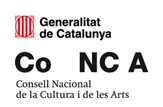Panel
Tools for Music or Music for Tools?
Chair: Cyril LaurierNew technologies offer a world of almost infinite possibilities that artists explore to create new music. However, in this world of all possibles, how new tools and instruments are designed? Is the technological progress always good for music? Must a modern musician be technical? Is there a technological temptation for the artist that can be a break on creativity?
The panel will have as speakers:
- Cristian Vogel (No future)
- Sergi Jordà (Music Technology Group, Reactable Experience)
- Arne Eigenfeldt (Simon Fraser University)
- Pietro Polotti (Conservatory of Trieste and University of Verona)
- Norbert Schnell Ircam (Ircam)
Participants:
Cristian Vogel is a composer, performer, producer and sound designer born in Chile and raised in the UK. He now lives and works in Barcelona. Cristian has released a number of influential electronic music albums as well as being the resident composer for Gilles Jobin's dance company in Geneva. He has toured globally and consistently since 1992, both as solo artist and in the groups Super_Collider and Night of the Brain. He has collaborated with artists such as Pieter-Jan Ginckels, as well as creating sound and visual installation art of his own. He is also an alpha tester for Symbolic Sound Kyma X music and sound design system, and organised the first International Kyma Users Symposium in Barcelona (October 2009). http://www.no-future.com/Sergi Jordà (Madrid, 1961) holds a B.S. in Fundamental Physics and a Ph.D. in Computer Science and Digital Communication. He is a researcher in the Music Technology Group of Universitat Pompeu Fabra in Barcelona, and a lecturer in the same university, where he teaches computer music, HCI, and interactive media arts. He has written many articles, books, given workshops and lectured though Europe, Asia and America, always trying to bridge HCI, music performance and interactive media arts. He has received several international awards, including the prestigious Ars Electronica’s Golden Nica in 2008. He is currently best known as one of the inventors of the Reactable, a tabletop musical instrument that accomplished mass popularity after being integrated in Icelandic artist Bjork’s last world tour, and he is one of the founding partners of the spin-off company Reactable Systems.
Arne Eigenfeldt (born August 18, 1962) is a Canadian composer and creator of interactive and generative music systems based in Vancouver. Both his music and his research into intelligent systems have been presented internationally. He is currently a professor of music at Simon Fraser University.[1] He also produces electronica under the pseudonym Raemus. Eigenfeldt has composed extensively for contemporary dance, especially in collaboration with choreographer Serge Bennathan. His electroacoustic music is predominantly live, predominantly generated or performed in software he has written in Max/MSP. His recent research focuses on encoding knowledge into intelligent performance systems.
Pietro Polotti received a musical education, studying piano, composition and electronic music. He also got a degree in physics. In 2002, he obtained a Ph.D. in communication systems from the Ecole Polytechnique Federale de Lausanne, Switzerland. Presently, he teaches Electronic Music at the Conservatory “G. Tartini” of Trieste, Italy. He also collaborates with the University of Verona as sound designer within various European research projects. During the last years, his interests moved from digital sound processing towards sonic interaction design and interactive arts focused on sound. He is part of the Gamelunch group - www.soundobject.org/BasicSID/Gamelunch. In 2008, he started with Maurizio Goina the EGGS project (Elementary Gestalts for Gesture Sonification - www.visualsonic.eu).
Norbert Schnell is born in Hamburg (in 1967) where early he gets engaged in music composition and arrangement for theatre. He moves to Graz/Austria to study Telecommunications and Music. Among his music theory teachers are Georg-Friedrich Haas, Bernhard Lang and Gerd Kühr. He becomes studio assistant at the Institut für Elektronische Musik (IEM) and gets involved in contemporary music projects with composers such as Beat Furrer and Robin Minard as developer and adviser. From 2002 to the end of 2007 he coordinates the Real-Time Applications and Real-Time Musical Interactions team at IRCAM. Besides the engagement into artistic productions at and around IRCAM with composers such as Pierre Boulez, Philippe Manoury, Emmanuel Nunes and Marco Stroppa, he participates in international research projects and collaborate with industry partners in the domains of music technology, education and simulation. Since 2008 he focuses on his PhD thesis on real-time interactive music media based on recorded sounds. In parallel he collaborates with several artists on interactive sound installations.






